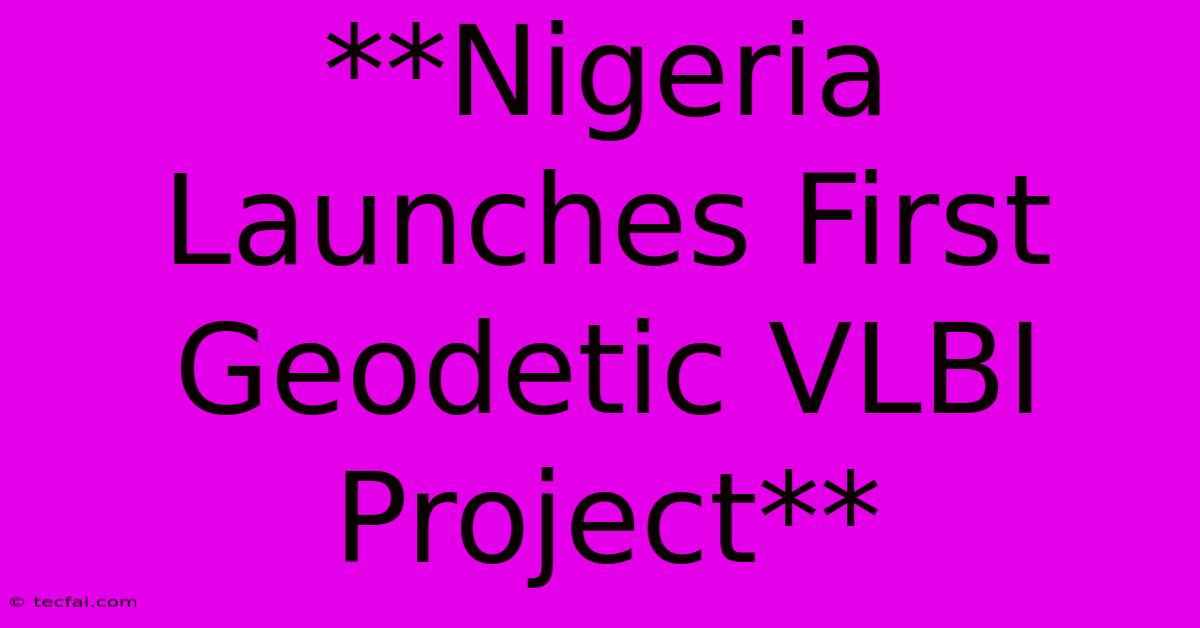**Nigeria Launches First Geodetic VLBI Project**

Discover more detailed and exciting information on our website. Click the link below to start your adventure: Visit Best Website tecfai.com. Don't miss out!
Table of Contents
Nigeria Launches First Geodetic VLBI Project: A Leap Forward in Geospatial Technology
Nigeria has taken a significant stride in advancing its geospatial capabilities with the launch of its first Geodetic Very Long Baseline Interferometry (VLBI) project. This ambitious undertaking marks a pivotal moment for the nation's scientific community and promises to revolutionize various sectors reliant on precise geospatial data. This article delves into the significance of this project, its implications for Nigeria's development, and its contribution to the global geodetic community.
Understanding Geodetic VLBI
Before exploring the Nigerian initiative, it's crucial to understand the technology at its core: Geodetic VLBI. VLBI is a sophisticated geodetic surveying technique that uses radio telescopes to measure the precise positions of celestial radio sources with incredible accuracy. By observing the same radio source from geographically separated telescopes, scientists can calculate the distances between these telescopes with millimeter-level precision. This information is invaluable for a wide range of applications, including:
- Precise Earth Orientation Parameter (EOP) Determination: VLBI contributes significantly to the global monitoring of Earth's rotation, providing critical data for navigation systems, satellite tracking, and timekeeping.
- Crustal Deformation Monitoring: By tracking subtle changes in the distances between VLBI stations over time, scientists can monitor tectonic plate movements and identify potential earthquake risks.
- Global Geodetic Reference Frame Establishment: VLBI plays a vital role in establishing and maintaining the International Terrestrial Reference Frame (ITRF), a globally consistent coordinate system used for mapping and positioning.
- Improving GPS Accuracy: Data from VLBI helps calibrate and improve the accuracy of Global Navigation Satellite Systems (GNSS) like GPS.
The Significance of Nigeria's Project
Nigeria's foray into Geodetic VLBI is not merely about technological advancement; it's about national development. The project's potential benefits are far-reaching:
- Enhanced Infrastructure Development: Precise geospatial data is essential for planning and implementing large-scale infrastructure projects, such as roads, railways, and dams. VLBI data will contribute to improved accuracy and efficiency in these projects.
- Improved Disaster Management: Accurate monitoring of crustal deformation can help predict and mitigate the impact of natural disasters like earthquakes and landslides.
- Support for Research and Education: The project will provide valuable training opportunities for Nigerian scientists and engineers, fostering expertise in a cutting-edge field.
- Strengthening International Collaboration: Participation in the global VLBI network will enhance Nigeria's standing within the international geodetic community.
Challenges and Future Prospects
While the launch of the project is cause for celebration, challenges remain. Securing sustained funding, developing the necessary human capital, and integrating the VLBI data into existing national geospatial infrastructure will be crucial for the project's long-term success.
However, the potential rewards are immense. This initiative positions Nigeria as a leader in geospatial technology in Africa, opening doors for further advancements in scientific research, economic development, and national security. The project's success will rely on continued investment, international collaboration, and a commitment to harnessing the power of precise geospatial data for the benefit of the nation. The future of geospatial technology in Nigeria looks brighter than ever, thanks to this pioneering VLBI project.
Keywords:
Nigeria, Geodetic VLBI, Very Long Baseline Interferometry, Geospatial Technology, Earth Orientation Parameters, Crustal Deformation, International Terrestrial Reference Frame, GPS, Infrastructure Development, Disaster Management, Scientific Research, African Geodesy.

Thank you for visiting our website wich cover about **Nigeria Launches First Geodetic VLBI Project** . We hope the information provided has been useful to you. Feel free to contact us if you have any questions or need further assistance. See you next time and dont miss to bookmark.
Featured Posts
-
Featured Products John Lewis Christmas Ad 2024
Nov 15, 2024
-
Bluesky A Twitter Alternative
Nov 15, 2024
-
Glastonbury Coach Tickets Minutes To Sell Out
Nov 15, 2024
-
Sap Spend Connect Innovation Success
Nov 15, 2024
-
Understanding Rfk Jrs Platform
Nov 15, 2024
